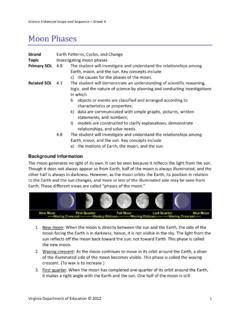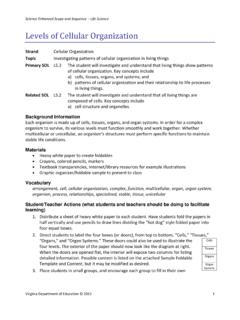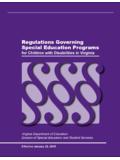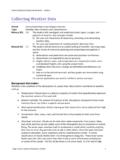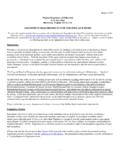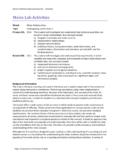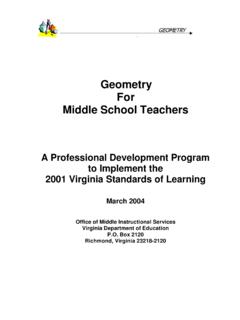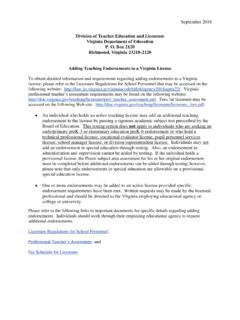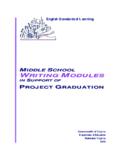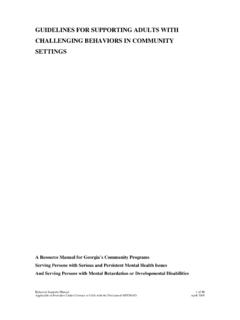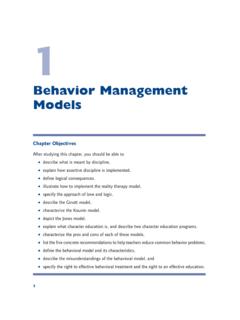Transcription of GUIDELINES FOR CONDUCTING FUNCTIONAL …
1 GUIDELINES for CONDUCTING FUNCTIONAL Behavioral Assessment and Developing Positive behavior Intervention and Supports/Strategies virginia department OF education DIVISION OF SPECIAL education AND STUDENT SERVICES GUIDELINES FOR CONDUCTING FUNCTIONAL BEHAVIORAL ASSESSMENT AND DEVELOPING POSITIVE behavior INTERVENTION AND SUPPORTS/STRATEGIES The virginia department of education does not discriminate on the basis of race, sex, color, national origin, religion, sexual orientation, gender identity, age, political affiliation, or against otherwise qualified persons with disabilities. The policy permits appropriate employment preferences for veterans and specifically prohibits discrimination against veterans. 2015 Commonwealth of virginia department of education This document may be reproduced and distributed for educational purposes.
2 No commercial use of this document is permitted. Contact the Division of Special education and Student Services prior to adapting or modifying this document for noncommercial purposes. virginia department of education Division of Special education and Student Services Web site: The intent of these GUIDELINES is to provide readers with general information regarding the FUNCTIONAL behavioral assessment (FBA) process. The GUIDELINES are not intended to serve as an alternative to the in-depth training required to conduct an FBA and develop a quality behavior intervention plan (BIP). Acknowledgements Internal Reviewers John Eisenberg, Assistant Superintendent, Special education & Student Services, virginia department of education Dr. Patricia C.
3 Abrams, Director, Special education Instructional Services, virginia department of education Andrew Greenidge, Monitoring Specialist, Special education Program Improvement, virginia department of education Ellen Harrison, Specialist Emotional Disabilities, Special education Instructional Services, virginia department of education Patricia Haymes, Director, Office of Dispute Resolution & Administrative Services, virginia department of education Deborah Johnson, Specialist Intellectual Disabilities, Special education Instructional Services, virginia department of education Dr. Teresa Lee, Specialist Learning Disabilities/Attention Disorders, Special education Instructional Services, virginia department of education Erin Smydra, Specialist Autism/Intellectual Disabilities/Assistive Technology, Special education Instructional Services, virginia department of education External Reviewers Julie Baker, Supervisor of Special education , Botetourt County Public Schools Linda S.
4 Bradford, education Director, VCU Medical Center, virginia Treatment Center for Children Carroll Butler, Professor, Old Dominion University Tammy Childress, Teacher-Liaison, Intensive Day Programs, Special education , Chesterfield County Public Schools Doug Cox, Consultant Brookie Fowler, Coordinator of Disabilities, Hopewell Public Schools Dr. Robert A. Gable, Constance and Colgate Darden Professor of Special education , Old Dominion University Elizabeth Germer, Director, Special education and Student Services, Falls Church City Public Schools, Region IV Margaret (Kay) Kline, George Mason University, TTAC Carolyn Lamm, Supervisor, Student support , Fauquier County Public Schools Dr. Nicholas Smith, Principal, Ivy Creek School, Charlottesville Special education Directors Regional Representatives Sharon Trimmer, Director of Special education , department of Juvenile Justice virginia Council of Administrators of Special education (VCASE) Pat Woolard, Old Dominion University, TTAC Nicole Wright-Guise, Alexandria Public Schools, Aspiring Leader GUIDELINES for CONDUCTING FUNCTIONAL Behavioral Assessment and Developing Positive behavior Intervention and Supports/Strategies _____Virginia department of education , Division of Special education and Student Services March 2015 ii Table of Contents Background.
5 1 Introduction .. 1 Developing a Function-based Intervention .. 2 When to Consider a FUNCTIONAL Behavioral Assessment .. 3 Research Supporting FUNCTIONAL Behavioral Assessment .. 4 CONDUCTING a FUNCTIONAL Behavioral Assessment .. 5 Verify the Seriousness of the Problem behavior .. 5 Define the Problem behavior .. 5 Collect Information on the Reasons Behind the Problem behavior .. 6 Analyze Information Collected on the Problem behavior .. 7 Develop a Hypothesis about the Function of the behavior .. 8 Verify the Hypothesis about the Function of the Problem behavior .. 8 Develop and Implement a Behavioral Intervention Plan .. 9 Evaluate the Fidelity of Implementation of the Plan .. 10 Evaluate the Effectiveness of the Intervention Plan.
6 11 Modify the Intervention Plan .. 11 Conclusion .. 12 References .. 13 Appendix A Forms .. 16 GUIDELINES for CONDUCTING FUNCTIONAL Behavioral Assessment and Developing Positive behavior Intervention and Supports/Strategies _____Virginia department of education , Division of Special education and Student Services March 2015 1 Background The 2004 reauthorization of the Individuals with Disabilities education Act, renamed the Individuals with Disabilities education Improvement Act (IDEA), contains various provisions that relate to the academic performance and classroom conduct of students with disabilities. These legislative provisions have a significant impact on the roles and responsibilities of school personnel in virginia . In response to this legislation, the virginia department of education (VDOE) formed a committee to examine various aspects of IDEA.
7 The committee was charged with addressing those legislative provisions that relate to student behavior that impedes the teaching/learning process. The information contained in this document grew out of a series of discussions on evidence-based practices for dealing with student behavior problems and is intended to address best practices in CONDUCTING a FUNCTIONAL behavioral assessment (FBA) and developing a behavior intervention plan (BIP). Committee members included parents, school administrators, psychologists, general and special education classroom teachers representing the public and private sectors, university researchers, teacher educators, and mental health and other community agency personnel. This guidance document is a revision of FUNCTIONAL behavior Assessments and Positive Intervention and Supports (fourth edition, 2008).
8 Introduction The federal regulations implementing IDEA do not define the terms FBA and BIP and specifically address FBAs and BIPs only in the context of discipline of students with disabilities. The Regulations Governing Special education Programs for Students with Disabilities in virginia , effective January 25, 2010, (the virginia Regulations) have added definitions of those terms, but otherwise mirror the federal regulations. The virginia Regulations provide that FUNCTIONAL behavioral assessment means a process to determine the underlying cause or functions of a child s behavior that impede the learning of the child with a disability or the learning of the child s peers. A FUNCTIONAL behavioral assessment may include a review of existing data or new testing data or evaluation as determined by the [Individualized education Program] IEP team.
9 In addition, the virginia Regulations describe a behavioral intervention plan as a plan that utilizes positive behavioral interventions and supports to address behaviors that interfere with the learning of students with disabilities or the learning of others or behaviors that require disciplinary action. School divisions are required to conduct FBAs and implement BIPs for students who have been subject to disciplinary actions where the conduct was determined to be a manifestation of the student s disability. School divisions may conduct FBAs and implement BIPs for students who have been long-term removed for conduct determined not to be a manifestation as deemed appropriate by the student s IEP team. While neither the federal nor virginia Regulations address other uses of FBAs and BIPs, both sets of regulations require that, as a part of IEP development, when a student s behavior impedes his learning or that of others, the IEP team must consider the use of positive behavioral interventions, strategies and supports to address the behavior .
10 A BIP is, by regulatory definition, one means of addressing interfering behaviors. As a result, although not directly addressed in GUIDELINES for CONDUCTING FUNCTIONAL Behavioral Assessment and Developing Positive behavior Intervention and Supports/Strategies _____Virginia department of education , Division of Special education and Student Services March 2015 2 the regulations, the VDOE has taken the position that, when an IEP team has conducted an FBA and developed a BIP for a student with a disability whose behavior interferes with his learning or that of others, that BIP must be treated as a part of and implemented with the same fidelity as the remainder of the IEP. Practice recommendations contained in this document are based on applied behavior analysis principles.
